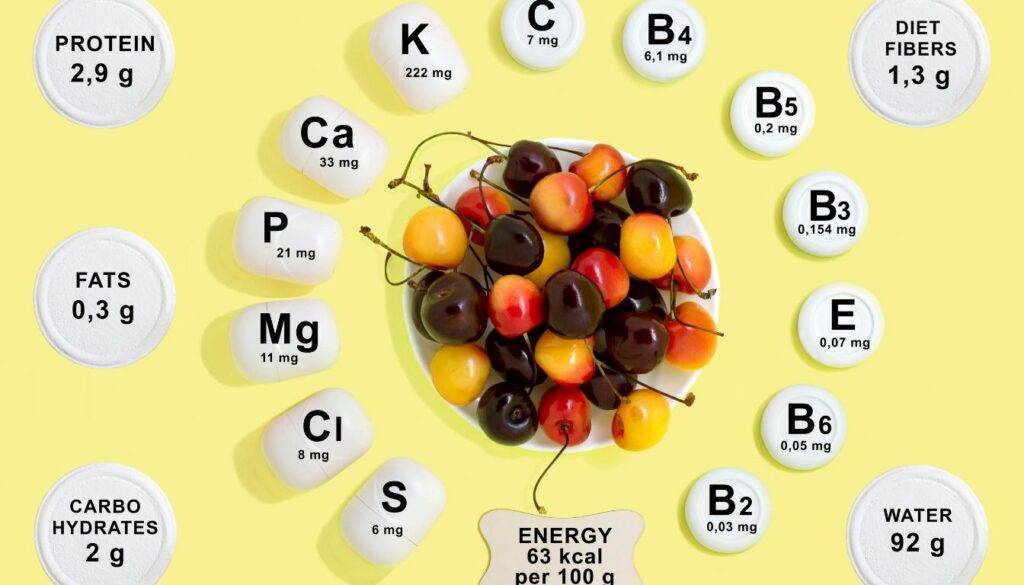Navigating the world of nutritious fruits can sometimes feel like a tricky maze we’re all navigating together. It’s a journey full of tasty discoveries, where we find gems like cherries and blueberries that are small in size but mighty in health benefits.
Our exploration delves deep into what sets these berries apart as dietary superheroes, arming you with the knowledge to enrich your eating habits. So get ready for an exciting adventure into how these tiny treasures can have a profound effect on your path to wellness—let’s uncover their secrets!
Overview of Cherries

In our collective quest for wellness, let’s turn the spotlight onto cherries, those bite-sized bursts of flavor. Cherries aren’t just about their alluring sweetness or tartness; they house a treasure trove of nutrients offering remarkable health benefits that might surprise you.
Let’s dive into the world of cherries and discover what makes them such a nutrient powerhouse in our diets.
Nutritional Value
Cherries pack a punch with their nutritional value. They’re not just tasty; they’re also full of vitamin B6 vitamin C, potassium, and fiber. These juicy gems help us stay healthy and energized.
We get antioxidants from cherries that fight off damage in our bodies caused by free radicals. Plus, they’ve got anthocyanins—those are the pigments that give cherries their deep red color and come with a bunch of health perks.
We love snacking on cherries because they bring so much goodness to our diet without any fat or cholesterol. You’ll find essential nutrients that keep your heart healthy and your body feeling good.
They even have compounds that cut down inflammation and ease pain—great news for anyone dealing with achy joints or soreness! Cherries have earned their place as a favorite fruit by being both delicious and super beneficial for our well-being.
Vitamins and Minerals
We understand the importance of incorporating nutrient-dense foods into our diets, and cherries are a delightful option. Packed with essential vitamins and minerals, they offer numerous health benefits, making them a great choice for anyone aiming to eat healthily. Let’s dive into the specifics of what cherries bring to the nutritional table.
| Vitamin/Mineral | Amount per 100g | Health Benefits |
|---|---|---|
| Vitamin C | 7 mg | Supports immune system, skin health, and tissue repair |
| Potassium | 222 mg | Regulates fluid balance, muscle contractions, and nerve signals |
| Fiber | 2.1 g | Promotes digestive health and may aid in weight management |
| Calcium | 13 mg | Essential for bone health and muscle function |
| Iron | 0.36 mg | Crucial for blood production and oxygen transport |
| Vitamin A | 64 IU | Important for vision, immune function, and skin health |
| Vitamin K | 2.1 µg | Plays a key role in blood clotting and bone metabolism |
| Vitamin E | 0.07 mg | Acts as an antioxidant, protecting cells from damage |
| Magnesium | 11 mg | Involved in over 300 enzymatic reactions in the body |
| Phosphorus | 21 mg | Important for healthy bones and teeth |
In our table, we’ve detailed the vitamins and minerals found in cherries, along with the health benefits they offer. Including cherries in our daily diet can contribute to overall well-being. They’re not just tasty—they’re fueled with goodness that helps our bodies thrive. Let’s keep making smart choices for our health, one spoon of cherry juice at a time.
Health Benefits
Cherries pack a punch when it comes to health benefits. They’re more than just a sweet treat; let’s dig into how they help our bodies.
- Fight Inflammation: Cherries contain compounds that reduce inflammation. This helps ease joint pain and can lessen the discomfort from conditions like arthritis.
- Protect Your Heart: Eating cherries lowers the risk of heart disease. Their nutrients work to keep your heart healthy by preventing damage to your blood vessels.
- Reduce Stroke Risk: Antioxidants in cherries guard against strokes by protecting the brain. They prevent harmful effects caused by free radicals.
- Keep Your Mind Sharp: These same antioxidants also lower dementia risks. That means cherries can help your brain stay sharp as you age.
- Manage Diabetes: If you have diabetes, cherries are your friend. They help regulate blood sugar levels, which is crucial for maintaining good health.
- Lower Blood Pressure: High blood pressure can lead to serious problems, but cherries can help bring it down. This makes them an excellent choice for a heart-friendly diet.
- Improve Sleep Quality: Cherries naturally have melatonin, which helps control sleep cycles. A bowl of cherries might be just what you need for better sleep!
Overview of Blueberries

Diving into the world of blueberries, we find a fruit cherished not only for its sweet and tangy flavor but also for an impressive nutritional profile that might just steal the spotlight.
These little blue powerhouses are loaded with essential nutrients and health-enhancing qualities that make them a top pick in our quest for well-being.
Nutritional Value
Blueberries pack a powerful nutritional punch in every tiny berry. They’re low in calories and carbohydrates while being rich in dietary fiber, which keeps our digestion happy. We get a burst of vitamin K and plenty of vitamin C, essential for our immune system.
These small berries are also brimming with manganese, helping us maintain strong bones and healthy skin.
We love how blueberries sprinkle antioxidants through every bite. Heart disease doesn’t stand a chance as these nutrients fight off the bad stuff like inflammation and oxidative stress.
Plus, they may lower our risk of cancer too! Every serving gives us that sweet taste along with health benefits galore – it’s like nature wrapped up goodness in a beautiful blue package just for us!
Vitamins and Minerals
We’re taking a closer look at the wealth of vitamins and minerals blueberries offer. These tiny fruits are nutritional powerhouses, supporting our quest for health and wellness. Let’s break down their impressive profile:
| Nutrient | Benefit | Amount per 1 cup (148g) |
|---|---|---|
| Vitamin K | Essential for blood clotting and bone health | 28.6 micrograms (24% DV) |
| Vitamin C | Antioxidant that supports immune function | 14.4 mg (16% DV) |
| Manganese | Plays a role in bone development and enzyme function | 0.5 mg (22% DV) |
| Fiber | Promotes digestive health | 3.6 g (13% DV) |
| Vitamin E | Helps protect cells from oxidative damage | 0.8 mg (5% DV) |
| Vitamin B6 | Contributes to brain health and energy metabolism | 0.1 mg (6% DV) |
| Folate | Essential for DNA synthesis and repair | 9 micrograms (2% DV) |
| Calcium | Important for bone health | 9 mg (1% DV) |
| Potassium | Helps with muscle function and electrolyte balance | 114 mg (2% DV) |
| Magnesium | Involved in over 300 enzyme reactions in the body | 9 mg (2% DV) |
| Phosphorus | Supports teeth and bone health | 18 mg (1% DV) |
| Iron | Crucial for transporting oxygen in the blood | 0.4 mg (2% DV) |
| Zinc | Supports immune system and wound healing | 0.2 mg (2% DV) |
| Riboflavin (B2) | Important for energy production | 0.1 mg (4% DV) |
| Niacin (B3) | Supports digestive system, skin, and nerves | 0.6 mg (4% DV) |
We often tout blueberries as a superfood, and for good reason. They’re not just delicious; they’re brimming with nutrients essential for our health. Dive into that bowl of juicy goodness, knowing you’re fueling your body with the very best nature has to offer.
Health Benefits
We all want to stay healthy and eating blueberries is a tasty way to help. These small berries pack a powerful punch when it comes to nutrition.
- Reduces Heart Disease Risk: Blueberries are full of antioxidants that can lower the risk of heart problems. These helpful substances fight off harmful molecules in our body that might lead to heart disease.
- Fights Cancer: Antioxidants in blueberries also work against cancer. They protect our cells from damage and may stop some cancers from growing.
- Improves Memory: Eating blueberries could make your memory better. Their nutrients have been linked to sharper thinking and better cognitive function as we age.
- Lowers Cholesterol: If you have high cholesterol, try adding blueberries to your diet. They help reduce bad cholesterol levels, making your heart rate happier.
- Enhances Blood Flow: Better blood flow means a healthier you! Blueberries improve blood vessel function, which is great for your overall health.
- Anti-Inflammatory Effects: Got swelling or pain from arthritis? Blueberries come with anti-inflammatory compounds that might bring relief.
- Eases Oxidative Stress: Our bodies sometimes struggle with oxidative stress, which can hurt our cells. The antioxidants in blueberries can calm this stress down.
- Supports Healthy Skin: Want glowing skin? The vitamins in blueberries support skin health and may even slow down signs of aging.
Nutritional Comparison Between Cherries and Blueberries
When it comes to cherries and blueberries, you might be wondering which of these nutritional powerhouses deserves the top spot in your diet—let’s delve into a side-by-side comparison that just might surprise you; stay tuned for a detailed breakdown that could reshape your fruit-eating habits.
Calories and Carbohydrates
We’ve got some interesting numbers to share about cherries and blueberries, especially if you’re counting calories or watching your carb intake. Cherries pack 63 calories per 100 grams – that’s less than blueberries, which come in at 80 calories for the same amount.
Now, we’re all looking for ways to enjoy our food without overdoing it on energy intake, right? Well, cherries give us a sweet break there.
But let’s talk carbs. We need them for energy, yet too much can be tricky business for our waistlines. Here’s where cherries step up again; they have more carbohydrates compared to blueberries.
That means they can provide a quicker burst of energy – perfect if you need a little pick-me-up during the day. Just keep in mind how this fits into your overall diet plan—it’s all about balance!
Vitamins
As we dive into the nutrient-rich world of cherries and blueberries, we’re uncovering a rainbow of vitamins essential for our well-being. These delightful fruits not only tantalize our taste buds but are also packed with vitamins that contribute to a healthy lifestyle. Let’s lay out the vitamin content of these two superfruits in a way that helps us see their benefits side by side.

| Vitamin | Cherries (per 100g) | Blueberries (per 100g) |
|---|---|---|
| Vitamin C | 7 mg | 9.7 mg |
| Vitamin A | 64 IU | 54 IU |
| Vitamin E | 0.07 mg | 0.57 mg |
| Vitamin K | 2.1 µg | 19.3 µg |
| The B Vitamins | Contains B6 and small amounts of other B vitamins | Rich in B6, and has notable levels of other B vitamins |
Cherries boast a good dose of vitamin C, a powerhouse that supports our immune system. Blueberries, too, shine in this category, offering even more of this antioxidant-rich vitamin. Our bodies crave these nutrients to fight off illnesses and keep our skin radiant.
Vitamin A makes an appearance in both fruits, ensuring our eyes stay sharp and our immune systems robust. Cherries provide marginally more, but both fruits contribute to our daily intake goals.
Turning our gaze to vitamin E, blueberries take the lead with a higher content. This vitamin guards our cells against damage, acting like a shield against free radicals.
Vitamin K, essential for blood clotting and bone health, shows a stronger presence in blueberries. They’re a fantastic choice for anyone looking to strengthen bones and maintain a healthy heart.
The B vitamins play a role too, with both fruits containing vitamin B6, which aids in metabolism and brain health. Blueberries come out slightly ahead with a broader profile of B vitamins, supporting energy levels throughout the day.
Cherries and blueberries, each with their unique vitamin profiles, are cornerstones of a health-conscious diet. They remind us that delightful flavors and nutritional benefits often come hand in hand, brightening our meals and our well-being.
– Vitamin C
We love how both cherries and blueberries offer us vitamin C. This powerhouse nutrient is key to keeping our immune systems strong and our skin glowing. A cup of sweet cherries has about 10 mg of vitamin C, while a serving of blueberries gives us almost 14 mg.
Eating these fruits can help us meet our daily needs for this important vitamin.
Let’s include more cherries and blueberries in our snacks or breakfasts! They make it easy to get that burst of vitamin C we need every day. And they’re not just tasty; they support our health in such an essential way.
It feels good to eat foods that are as beneficial as they are delicious, doesn’t it?.
– Vitamin A
Vitamin A is a fat-soluble vitamin that’s key for maintaining vision, promoting growth and immune function. Yet, when it comes to cherries and blueberries, they’re not your go-to sources.
Let’s clear up some confusion here – while both fruits have a spectrum of health benefits, Vitamin A isn’t one of the stars in their nutritional lineup.
Instead of relying on these berries for Vitamin A, look towards other foods like carrots, sweet potatoes and dark leafy greens. These are packed with beta-carotene which our bodies convert into Vitamin A.
Cherries and blueberries still shine bright in other areas though! They bring plenty to the table with their unique mix of vitamins and minerals that support overall wellness. So enjoy them often; just remember there are more pieces to the healthy eating puzzle when it comes to meeting your Vitamin A needs.
– Vitamin E
We know you’re looking out for vitamin E in your diet, and we’ve got some news about cherries and blueberries. These tasty fruits aren’t packed with this particular vitamin. But don’t worry—they make up for it! Cherries and blueberries are bursting with other essential nutrients that play an important role in keeping us healthy.
In our quest for well-being, we often turn to fruits like cherries and blueberries for their health benefits. Even though they’re not a go-to source for vitamin E, these small powerhouses supply us with loads of antioxidants.
These natural substances help protect the body from damage that can lead to serious conditions like heart attacks or dementia. So while you may not get your vitamin E fix from them, including these berries in your balanced diet is still a smart move toward overall good health.
– Vitamin K
Let’s talk about Vitamin K, friends. Blueberries shine here! They’re packed with this essential vitamin that helps our bodies make blood clots. We need these clots if we get a cut or scrape – they stop the bleeding.
Cherries, though sweet and delicious, don’t have much Vitamin K in them.
If you’re looking to boost your intake of this key nutrient, try tossing a cup of blueberries into your cereal or smoothie. It’s an effortless way to help your body stay on top of its blood-clotting game while enjoying some juicy goodness.
Keep blueberries on your go-to list for snacks that pack a nutritious punch!
– The B Vitamins
Cherries and blueberries might not pack a big punch of vitamin B, but that’s okay. These tiny nutrients support our energy levels and keep our nerves healthy. They come from different foods like whole grains, meat, and dairy products.
That means we can still enjoy the sweet goodness of cherries and blueberries without missing out.
We love these fruits for their taste and health perks, even if B vitamins aren’t their strong suit. It’s all about balance in our diet! We can grab other foods to fill up on those B vitamins while savoring every juicy bite of cherry or tangy burst from a glass of blueberry juice.
Life’s too short not to have variety on our plates!
Minerals
We can’t ignore the power of minerals in our diets. They’re like tiny spark plugs that keep our bodies running smoothly. In the showdown between cherries and blueberries, it’s a close match with both offering some major mineral benefits. Cherries step up with a good source of potassium—essential for heart health and muscle function. On the other hand, blueberries aren’t slouches either; they’re packed with calcium and iron which are crucial for strong bones and keeping our energy levels up.
Diving deeper into these tasty fruits reveals more about their mineral content. Sure, we’ve got cherries leading with their high levels of potassium, but let’s not forget how they also bring calcium, iron, and magnesium to the table—true champions in supporting a range of body functions from brain health to immune defense. Meanwhile, blueberries might take second place in the potassium race but still boast an impressive lineup of omega-3 and omega-6 fatty acids that play a big role in brain function and overall health. So whether you’re team cherry or team blueberry—or better yet, enjoy them both—you’re fueling your body with some serious mineral goodness!
– Calcium
Let’s talk about calcium in cherries and blueberries. You might think these fruits are good sources, but they’re not. In fact, both cherries and blueberries have pretty low levels of calcium.
So if you’re looking to boost your bone health, you’ll need to look elsewhere.
Now, don’t get us wrong—these fruits have lots of other great nutrients. But for strong bones and teeth, include foods like milk, cheese, or leafy greens alongside your fruity snacks.
Remember this little tip: mix up what you eat to cover all the bases!
– Iron
We can’t ignore the power of iron in our diet, and cherries come packed with this essential mineral. Our bodies need iron to make hemoglobin, a protein in red blood cells that carries oxygen to all parts.
Eating cherries helps us get more iron which means more oxygen flows through our body.
Cherries offer a sweet way to boost your iron intake without much effort. Just grab a handful of fresh cherries or blend them into a smoothie and you’re on your way to meeting your daily needs.
It’s simple changes like these that can have big impacts on our health over time.
– Potassium
Let’s talk about potassium, an essential mineral that your body needs to keep your heart beating right and muscles moving smoothly. Cherries are a powerhouse when it comes to potassium—did you know they have 188% more of this vital nutrient than blueberries? That’s huge for us who want to eat smart and take care of our health.
Blueberries, on the other hand, fall a bit short in the potassium department. There isn’t much data showing they’re a go-to source for this mineral. But let’s not forget: both these fruits bring their own unique set of benefits to the table! So while we enjoy their sweet flavors, cherries get extra points for giving our bodies a bigger boost of potassium.
Dietary Fiber
We all need dietary fiber to keep our digestion in good shape. Cherries and blueberries pack a powerful punch of this essential nutrient. Blueberries come out slightly on top, containing 14% more fiber than cherries.
But don’t count cherries out—both are excellent sources! Fiber helps us feel full longer, manages blood sugar levels, and keeps our bowel movements regular.
Chewing on these fruits gives our bodies the roughage needed for a healthy gut. Plus, they help ward off those pesky cravings by keeping us satisfied between meals. Let’s make sure we’re tossing plenty of these tiny nutritional powerhouses into our snacks and meals for that much-needed fiber boost!
Sugar Content
Cherries and blueberries both bring sweetness to our diet, but let’s compare their sugar content. Cherries have 12.8 grams of sugar per 100 grams — that’s slightly more than blueberries, which have 10 grams.
Eating these fruits offers us natural sugars and keeps our calorie count low.
Keeping an eye on sugar intake is important for a healthy lifestyle. Cherries might be a bit sweeter, but they’re still a great choice for anyone watching their sugar levels. Blueberries are not far behind, providing just enough sweetness without overdoing it.
Enjoy them as part of your balanced diet!
Protein Content
We’re always on the lookout for foods that pack a nutritious punch, and both cherries and blueberries fit the bill when it comes to protein content. On average, every 100 grams of cherries provides us with 1.1 grams of protein.
Blueberries offer slightly less, at about 0.74 grams per 100 grams—but that’s still impressive for such small fruits! These amounts contribute nicely to our daily protein needs, especially considering they come bundled with a host of other nutrients.
Now, we shouldn’t rely on fruits like cherries and blueberries as our primary protein sources—they’re no match for beans or meats in that department. But they give us a nice little boost alongside their other health benefits.
Including these berries in our snacks or meals is an easy way to add some extra proteins into our diet without even trying hard—plus they taste fantastic!
Saturated Fat
Cherries and blueberries both shine when it comes to low saturated fat content. In fact, they’re pretty much on par with each other; blueberries have just 0.03 grams while cherries pack a tiny bit more at 0.04 grams per 100-gram serving.
This makes them fantastic choices if you’re looking to keep your heart happy and your blood vessels clear.
Keeping our bodies healthy means paying attention to the type of fats we consume. Saturated fats can raise bad cholesterol levels, so we need to watch out for them in our diet. Luckily, incorporating cherries and blueberries into our meals gives us less to worry about on that front.
They help us enjoy something sweet without the downside of unhealthy fats – truly a win-win!
Antioxidants and Phytonutrients in Cherries and Blueberries

Bursting with color and flavor, cherries and blueberries aren’t just a treat for the taste buds; they’re armed to the teeth with antioxidants and phytonutrients. These nutritional powerhouses pack a punch in defending our bodies against oxidative stress—let’s dive into the specifics of what makes them such formidable allies in our health arsenal.
Flavonoids
We all want to eat foods that are not only delicious but also good for our health. Cherries and blueberries pack a punch with something called flavonoids. These mighty nutrients work hard to keep your body strong.
They fight off heart disease and even some types of cancer.
Think of flavonoids like your body’s own superhero team. In cherries and blueberries, they swoop in to reduce inflammation and combat the stress on our cells. This can mean better cholesterol levels and smoother blood flow through your veins.
And with their anti-cancer powers, these fruits are more than just tasty—they’re a smart choice for keeping us healthy as we enjoy every bite.
Carotenoids
Carotenoids give cherries and blueberries their brilliant reds and blues, marking them as antioxidant powerhouses. These nutrients do much more than just add color; they fight inflammation and may reduce our disease risks like cancer and heart disease.
Eating these fruits can be a game changer for our health, providing benefits we might not even see but definitely feel.
Let’s make room in our diets for the vibrant hues of cherries and blueberries. Their carotenoids work quietly behind the scenes to bolster our defense against illness. With every bite, we’re tapping into nature’s color-coded clue that says “Here’s something good for you!” So let’s enjoy these flavorful fruits as part of a balanced diet—they’re packed with goodness that helps keep us on track toward overall wellbeing.
Omega-3 and Omega-6
Cherries and blueberries pack a powerful punch with omega-3 and omega-6 fatty acids. We often hear about these fats regarding fish, but our favorite berries have them too! These little wonders do more than just add flavor to our snacks—they bring anti-inflammatory power to the table.
They work hard to keep us healthy by fighting inflammation that can lead to heart disease and cancer.
Eating cherries and blueberries is like giving your body a suit of armor against illness. The combination of these fatty acids with the fruits’ antioxidants creates a team that reduces harmful oxidative stress in our bodies.
This means they help lower cholesterol levels as well, which is great news for our hearts! Let’s keep enjoying these tasty treats knowing they’re doing so much good inside us.
Role of Cherries and Blueberries in Disease Management

We know that staying on top of our health can be a challenge. Eating cherries and blueberries might just make it easier. These small fruits pack a punch when it comes to managing diseases.
They bring down inflammation and oxidative stress, helping to protect our hearts. For those of us watching our blood sugar or fighting high blood pressure, these berries are true allies.
Let’s talk about easing pain and fighting cancer too. Cherries have special compounds that help lessen the ache of osteoarthritis and gout—no wonder they’ve been called nature’s painkillers! Blueberries join in by bringing their own anti-cancer powers into the mix.
They work against some tough enemies like breast, colon, and prostate cancers. Adding these fruits to our diet is a smart move for keeping illness at bay.
Impact of Cherries and Blueberries on Dietary Requirements

Cherries and blueberries can make a big difference in our diets. These fruits pack a punch with their high nutrient content. Eating cherries gives us vitamins A, C, E, and K, plus iron and potassium.
This means we get to support our immune system, eyesight, and heart health all in one go. With blueberries, we add more fiber to our meals while keeping sugar levels down.
Add these berries to your daily eating plan for a healthy boost. Their antioxidants fight off harm from bad cells that can lead to sickness. Plus, the fiber helps our digestion stay on track.
By choosing cherries and blueberries as snacks or part of meals, we take steps toward better health without much effort. They help us meet dietary goals like reducing inflammation and lowering cancer risks—and they taste great!
Comparison with Other Fruits
As we dive into the colorful world of fruits, our journey doesn’t end with cherries and blueberries—there’s a whole spectrum to explore. From the crisp sweetness of apples to the tangy burst of citrus in grapefruit, each fruit brings its own set of nutritional triumphs and tantalizing flavors that can jazz up our diet in unique ways.
Let’s broaden our horizons and discover how these two darlings stack up against the wider fruit family.
Apples
We all love the crunch and sweetness of a fresh apple. They’re not just delicious—they pack a punch for our health too. Apples are low in calories, which is great news if we’re watching our weight.
Plus, they have lots of fiber to keep us feeling full longer.
These round wonders also help fight against inflammation, thanks to their anti-inflammatory compounds. This can be especially helpful for those annoying aches and pains we sometimes feel.
Apples also play a role in controlling blood sugar levels, making them a smart choice for managing diabetes.
For folks focused on heart health, apples should be on your list! They may lower the risk of heart disease—a concern many of us have as we get older. Our immune system gets a boost from apples as well since they’re loaded with vitamin C.
Whether we chop them up in salads or enjoy them as snacks, apples are versatile and beneficial in so many ways!
Strawberries
Strawberries bring a burst of sweet and tangy flavor to our tables, along with powerful health benefits. They are not just delicious; they’re low in calories and high in fiber, which is great for managing diabetes and keeping blood sugar levels steady.
Eating strawberries might also protect us from scary illnesses – studies show they have special compounds that fight off cancer.
Let’s talk about how strawberries can keep us healthy. These red jewels help lower the risk of breast, colon, and prostate cancers, making them an excellent choice for staying disease-free.
Plus, their anti-cancer properties come without any extra baggage – no high calorie count or unwanted fats! Strawberries make a tasty snack that fits perfectly into our quest for better health.
Raspberries
We love how raspberries add a burst of color and flavor to any dish. These little red gems are not just delicious; they’re also filled with nutrients that do wonders for our health.
Packed with antioxidants, vitamins, and minerals, raspberries fit perfectly into our quest for healthy eating.
Imagine snacking on a fruit that’s low in calories yet high in fiber—raspberries are exactly that! They help us feel full longer without the extra calorie load. Studies suggest compounds in raspberries may even have anti-cancer properties, giving us one more reason to include them in our diets.
Whether we toss them into a salad or blend them into a smoothie, we’re making smart choices towards better health.
Pineapple
Pineapples pack a powerful punch of vitamin C and manganese, important for keeping our bodies healthy and strong. These tropical treats are light on calories yet high in fiber, perfect for fitting into our balanced diets.
Their antioxidants help soothe inflammation and combat oxidative stress, which can take a toll on our well-being.
Eating pineapples supports digestion due to their rich fiber content. They also bring bromelain to the table—an enzyme that boosts anti-inflammatory and digestive actions. This fruit is more than just tasty; it’s a helper in strengthening immune systems with its impressive amount of vitamin C.
Pineapple is definitely worth adding to your grocery list for a boost in health benefits!
Grapefruit
Grapefruit packs a punch with vitamin C and fiber. Let’s not forget, it’s a champion for our hearts too! The antioxidants do wonders—fighting inflammation and fending off heart disease.
Plus, this citrus superstar holds anti-cancer compounds that take on certain cancers like true warriors.
We love grapefruits for their low fats and zero cholesterol. They’re perfect for keeping those cholesterol levels in check. And here’s the kicker: they might just sharpen your memory and boost cognitive powers.
Feeling full longer without many calories is another win-win thanks to the high fiber content of grapefruits. For anyone aiming to keep their weight healthy, adding grapefruit to your diet sounds like a smart move, right?.
Avocado
Avocados stand out for their unique nutrition profile. They’re rich in healthy fats, fiber, and are a powerhouse when it comes to potassium. Many of us love adding them to our salads, sandwiches, and smoothies — and let’s not forget the ever-popular guacamole! This creamy fruit is versatile and complements many dishes beautifully.
Now consider this: avocados are high in calories compared to cherries and blueberries. But don’t let that scare you off! These calories come from monounsaturated fats which are good for your heart.
Plus, avocados help your body absorb nutrients from other veggies. So pairing them with foods rich in vitamin A or D can boost those nutrient levels big time.
Banana
We love bananas for their sweet taste and creamy texture. They’re not just delicious; they pack a powerful nutritional punch, too! High in potassium and vitamin C, these fruits are stars in supporting our heart health.
Plus, they have antioxidants that fight disease and keep our bodies strong.
Grabbing a banana can give us a quick energy boost before exercise or during a busy day. They’re perfect for folks on the go who want to eat healthy without spending much time preparing food.
The best part? Bananas help with digestion and can keep blood sugar levels steady. That’s why we always keep them handy as a nutritious snack option!
Cranberry
Cranberries burst with vitamin C and fiber, making them stars in the fruit world. They’re tiny but mighty fighters for our health. These tart berries help manage diabetes by keeping blood sugar levels in check.
Think of cranberries as little guardians that can soothe inflammation throughout the body.
Their power doesn’t stop there—cranberries pack anti-cancer compounds too. They work hard to lower the risk of some cancers, showing us that good things often come in small packages.
Including cranberries in your diet isn’t just a tasty choice; it’s a smart move for long-term wellness.
Storing and Consuming Cherries and Blueberries
When it comes to cherries and blueberries, we all want to enjoy their benefits year-round—let’s explore how proper storage can maximize freshness and taste. Whether you’re tossing them into a morning smoothie or snacking straight from the bowl, knowing the ins and outs of storing these little gems will keep your healthy habits on track without losing out on flavor or nutrients.
Fresh Fruit
We love keeping our cherries and blueberries fresh. To do this, we store them in the fridge as soon as we get home from the market. Cherries stay good for about a week while blueberries can last up to two weeks.
This means we have tasty, nutritious snacks ready to eat anytime!
Eating fresh fruit like cherries and blueberries is a smart choice for all of us wanting a healthier lifestyle. They’re packed with fiber, low in calories, and brimming with vitamins and minerals.
Plus, these little fruits add a burst of flavor to any meal or snack time! Let’s make sure we enjoy them often.
Frozen Fruit
You might worry that freezing cherries and blueberries will lose their goodness. Let’s put that fear to rest. Freezing these fruits locks in their nutrients and flavor, making them last much longer.
Imagine enjoying the taste of summer even during a chilly winter—frozen cherries and blueberries make that possible.
Keep bags of frozen cherries and blueberries on hand for smoothies, baking, or as an icy snack. They’re just as nutritious as fresh ones and can save you time too. No washing or picking through is needed —they’re ready to use! Plus, they help reduce waste because you only use what you need; the rest stays frozen until next time.
Conclusion – Wrapping Up
We’ve explored the wonders of cherries and blueberries, each packed with their own unique goodness. These fruits aren’t just tasty—they’re health powerhouses too. Remember, whether it’s a handful of tart cherries or a bowl of sweet blueberries, you’re doing something great for your body.
Mix them into your meals; they’ll add color and a nutritional punch. Let’s enjoy these gifts from nature, not only for their flavors but also for our health!
